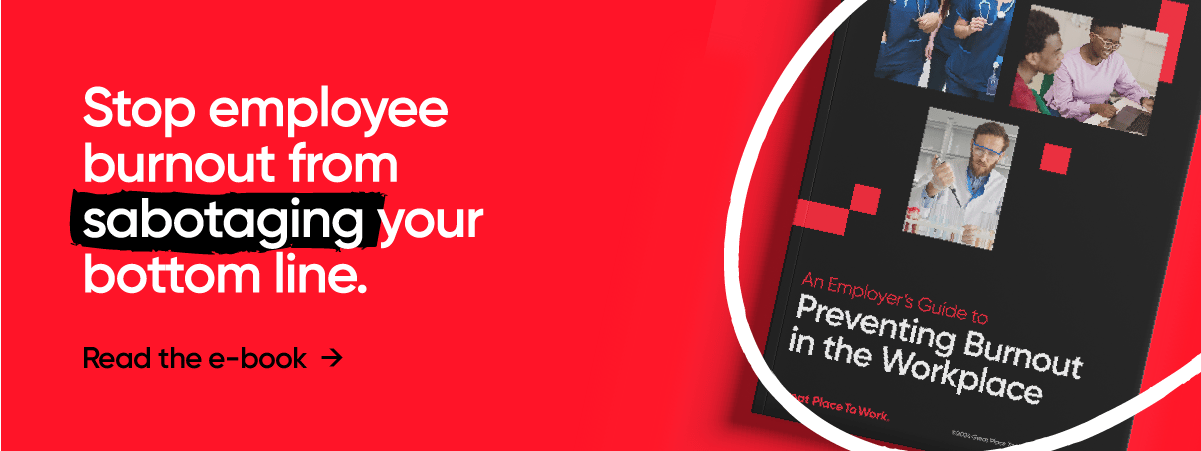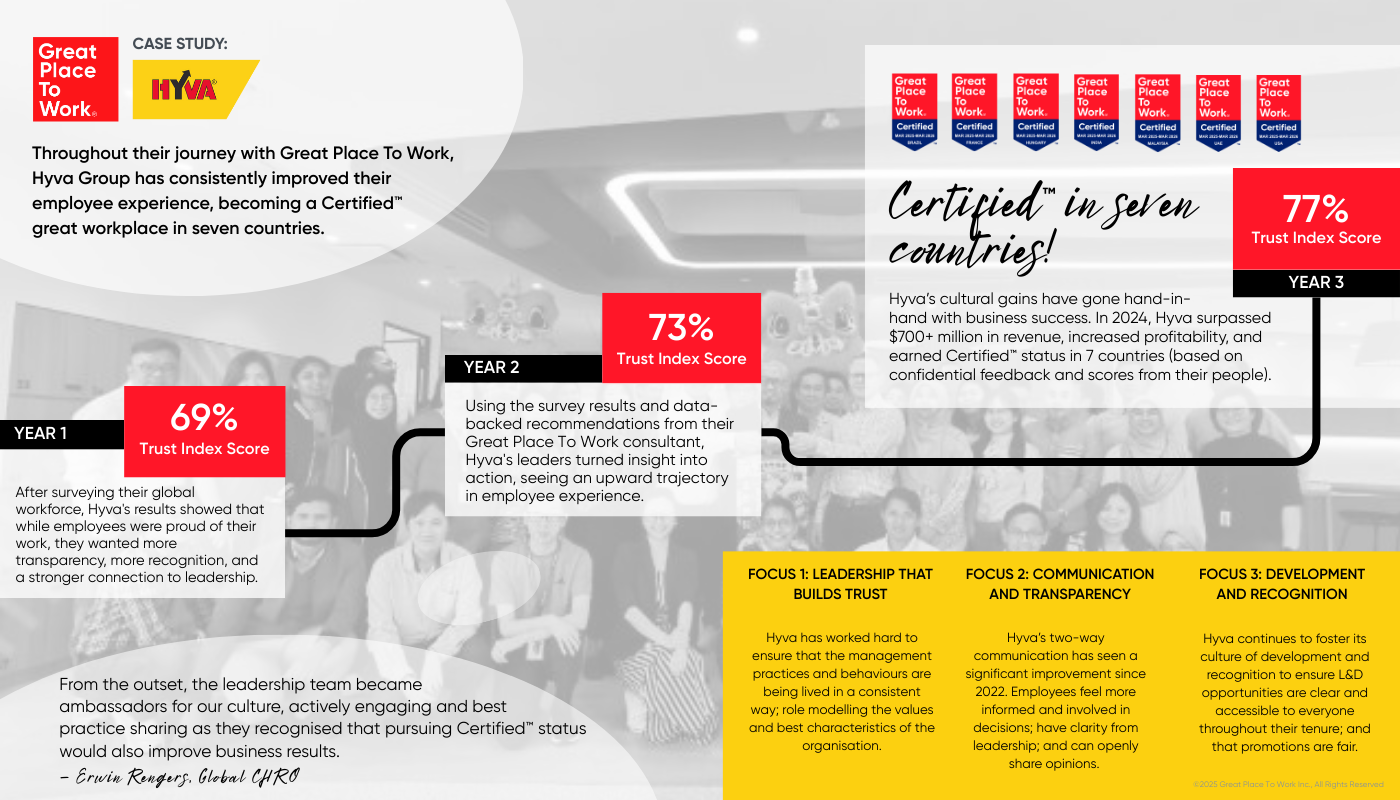Employee pulse surveys offer a fast and practical solution for businesses looking to improve staff communication. But what exactly are they?
Before we explore the ins and outs of employee pulse surveys, lets first consider why communication is so important in the workplace.
Communication is key to employee engagement. By fostering an open and transparent culture where employees feel their opinion is valued, organisations can expect to see higher retention rates and a more dedicated workforce.Our Population Study data shows that UK employees who believe management genuinely seeks and responds to feedback are:
-
5x more likely to want to stay at their company for a long time
-
4x more likely to feel their work is ‘more than just a job’
-
4x more likely to agree people ‘give extra’ to get the job done
Communicating with employees doesn’t have to be difficult. In fact, there are an abundance of digital tools available that make it simpler than ever for leaders to check in with their staff. One tool that can help bridge the gap between employers and employees is a pulse survey.
What is a pulse survey?
A pulse survey is a short set of questions used to measure real-time employee attitudes (their ‘pulse’) towards a specific topic.
Unlike employee engagement surveys, which can have anywhere up to 70 questions, employee pulse surveys feature less than 20 questions and take minutes to complete.
This conciseness means pulse surveys can be repeated regularly (usually quarterly or monthly) without fatiguing employees. By checking in frequently, organisations are able to identify trends, observe changes, and act fast on any employee issues that arise.
What can be measured using employee pulse surveys?
Management can use pulse surveys to gather feedback on whatever they deem important. Whilst certain topics may hold stronger relevance in specific sectors, common themes used for employee pulse surveys include:
Employee Wellbeing
Example statement 1: My organisation genuinely prioritises employee wellbeing.
Example statement 2: I know where to get support when my mental wellbeing is being impacted.
Learning & Development
Example statement 1: I am given an opportunity to improve my skills at this organisation.
Example statement 2: There are good career opportunities for me at this organisation.
Diversity and Inclusion
Example statement 1: People here are paid based on merit, irrespective of their demographic background.
Example statement 2: Our leaders understand how crucial diversity is to our future success.
When executed successfully, pulse surveys provide invaluable insight into how staff are feeling - but many companies overlook the knowledge required to curate an effective employee pulse survey.
For most organisations, the best plan of attack is to use an external survey provider. As experts in the field, survey providers know the right questions to ask and how to ask them – resulting in higher response rates and richer data.
What are the benefits of using pulse surveys?
Employee pulse surveys offer numerous benefits for companies of all sizes and sectors. Here are three of our favourites:
1. They're easy to use
Pulse surveys offer a simplified approach to employee communication. Once the initial set up is complete, the surveys can be used time and time again. They can even be automated to send at regular intervals. This ease of use makes them a hit with organisations looking to gain impactful data whilst using minimal time and resource.
2. They can improve employee satisfaction
Pulse surveys foster a culture of transparency and trust. When employees see that their opinions are valued and their feedback is acted upon, they are more likely to feel engaged and committed to the organisation. This can lead to higher job satisfaction and increased productivity.
3. They can pre-empt employee issues
Pulse surveys help identify potential issues early on, allowing you to implement targeted interventions and prevent them from escalating. By nipping problems in the bud, you can save valuable time and resources, ensuring a positive work environment for all.
| Useful Read : 5 Tips to Improve Employee Survey Response Rates
What are the best practices for employee pulse surveys?
The aim of pulse surveys is to gather employee feedback that can then be used to enhance your workplace. To maximise the potential of your employee pulse surveys, we recommend following these best practices:
- Conciseness is key: Pulse surveys should be short and focused on specific employee engagement areas. This allows staff to give meaningful feedback without feeling like they are constantly repeating themselves.
- Keep it consistent: Pulse surveys provide the richest results when repeated regularly. By establishing a regular sending schedule, you’ll be able to track engagement and trends over time.
- Highlight the purpose: Employees can easily bypass a request to complete a pulse survey – particularly if they are busy with other tasks. Communicating the importance of the survey and highlighting how the feedback will be used to improve the workplace can help increase participation rates.
- Take action: Once employees have completed their pulse surveys, it’s your responsibility to act on the feedback. Show your employees that their voices have been heard by presenting the results to them and communicating the steps you’ll take to address any concerns. Follow through on your promises and implement the changes needed to improve the workplace. Otherwise, you risk losing their trust.
- Keep track of progress: Regularly review your employee pulse survey data and use it to assess whether the strategies you’ve implemented are performing. If the results aren’t as promising as expected then adjust your plan to compensate.
| Related: How to Turn Your Survey Results into an Effective Action Plan
Is it time you started running employee pulse surveys?
Employee pulse surveys serve as a reliable and efficient way to capture employee feedback and track changes over time. By regularly conducting pulse surveys, organisations can proactively address issues, enhance employee satisfaction, and drive positive organisational outcomes.
If you're ready to understand where your company stands with your employees, we're perfectly placed to guide you through the survey process. Get in touch today.
*Figure based on Statista data reporting 31.76 million people employed in the UK, combined with data from our 2023 Population Study that showed 37% of UK employees feel management does not keep them informed about important issues and changes.








